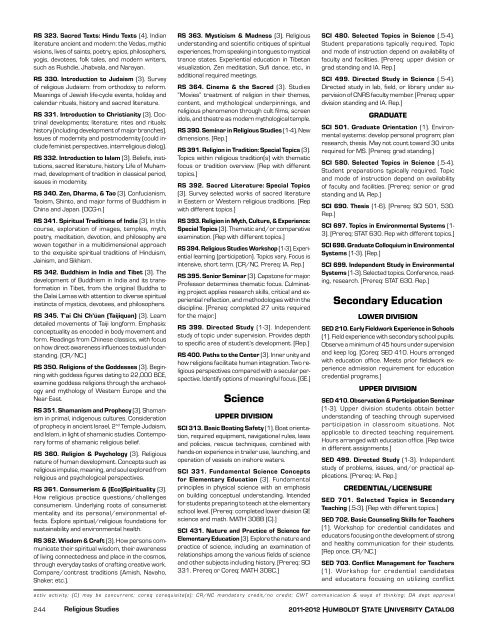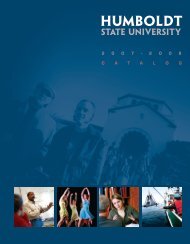2011-12 Academic Year - Bad Request - Humboldt State University
2011-12 Academic Year - Bad Request - Humboldt State University
2011-12 Academic Year - Bad Request - Humboldt State University
You also want an ePaper? Increase the reach of your titles
YUMPU automatically turns print PDFs into web optimized ePapers that Google loves.
RS 323. Sacred Texts: Hindu Texts (4). Indian<br />
literature ancient and modern: the Vedas, mythic<br />
visions, lives of saints, poetry, epics, philosophers,<br />
yogis, devotees, folk tales, and modern writers,<br />
such as Rushdie, Jhabvala, and Narayan.<br />
RS 330. Introduction to Judaism (3). Survey<br />
of religious Judaism: from orthodoxy to reform.<br />
Meanings of Jewish life-cycle events, holiday and<br />
calendar rituals, history and sacred literature.<br />
RS 331. Introduction to Christianity (3). Doctrinal<br />
developments; literature; rites and rituals;<br />
history (including development of major branches).<br />
Issues of modernity and postmodernity (could include<br />
feminist perspectives, interreligious dialog).<br />
RS 332. Introduction to Islam (3). Beliefs, institutions,<br />
sacred literature, history. Life of Muhammad,<br />
development of tradition in classical period,<br />
issues in modernity.<br />
RS 340. Zen, Dharma, & Tao (3). Confucianism,<br />
Taoism, Shinto, and major forms of Buddhism in<br />
China and Japan. [DCG-n.]<br />
RS 341. Spiritual Traditions of India (3). In this<br />
course, exploration of images, temples, myth,<br />
poetry, meditation, devotion, and philosophy are<br />
woven together in a multidimensional approach<br />
to the exquisite spiritual traditions of Hinduism,<br />
Jainism, and Sikhism.<br />
RS 342. Buddhism in India and Tibet (3). The<br />
development of Buddhism in India and its transformation<br />
in Tibet, from the original Buddha to<br />
the Dalai Lamas with attention to diverse spiritual<br />
instincts of mystics, devotees, and philosophers.<br />
RS 345. T’ai Chi Ch’üan (Taijiquan) (3). Learn<br />
de tailed movements of Taiji longform. Emphasis:<br />
conceptuality as encoded in body movement and<br />
form. Readings from Chinese classics, with focus<br />
on how direct awareness influences textual understanding.<br />
[CR/NC.]<br />
RS 350. Religions of the Goddesses (3). Beginning<br />
with goddess figures dating to 22,000 BCE,<br />
examine goddess religions through the archaeology<br />
and mythology of Western Europe and the<br />
Near East.<br />
RS 351. Shamanism and Prophecy (3). Shamanism<br />
in primal, indigenous cultures. Consideration<br />
of prophecy in ancient Israel, 2nd Temple Judaism,<br />
and Islam, in light of shamanic studies. Contemporary<br />
forms of shamanic religious belief.<br />
RS 360. Religion & Psychology (3). Religious<br />
nature of human development. Concepts such as<br />
religious impulse, meaning, and soul explored from<br />
religious and psychological perspectives.<br />
RS 361. Consumerism & (Eco)Spirituality (3).<br />
How religious practice questions/challenges<br />
consumerism. Underlying roots of consumerist<br />
mentality and its personal/environmental effects.<br />
Explore spiritual/religious foundations for<br />
sustainability and environmental health.<br />
RS 362. Wisdom & Craft (3). How persons communicate<br />
their spiritual wisdom, their awareness<br />
of living connectedness and place in the cosmos,<br />
through everyday tasks of crafting creative work.<br />
Compare/contrast traditions (Amish, Navaho,<br />
Shaker, etc.).<br />
RS 363. Mysticism & Madness (3). Religious<br />
understanding and scientific critiques of spiritual<br />
experiences, from speaking in tongues to mystical<br />
trance states. Experiential education in Tibetan<br />
visualization, Zen meditation, Sufi dance, etc., in<br />
additional required meetings.<br />
RS 364. Cinema & the Sacred (3). Studies<br />
“Movies” treatment of religion in their themes,<br />
content, and mythological underpinnings, and<br />
religious phenomenon through cult films, screen<br />
idols, and theatre as modern mythological temple.<br />
RS 390. Seminar in Religious Studies (1-4). New<br />
dimensions. [Rep.]<br />
RS 391. Religion in Tradition: Special Topics (3).<br />
Topics within religious tradition(s) with thematic<br />
focus or tradition overview. [Rep with different<br />
topics.]<br />
RS 392. Sacred Literature: Special Topics<br />
(3). Survey selected works of sacred literature<br />
in Eastern or Western religious traditions. [Rep<br />
with different topics.]<br />
RS 393. Religion in Myth, Culture, & Experience:<br />
Special Topics (3). Thematic and/or comparative<br />
examination. [Rep with different topics.]<br />
RS 394. Religious Studies Workshop (1-3). Experiential<br />
learning (participation). Topics vary. Focus is<br />
intensive, short term. [CR/NC. Prereq: IA. Rep.]<br />
RS 395. Senior Seminar (3). Capstone for major.<br />
Professor determines thematic focus. Culminating<br />
project applies research skills, critical and experiential<br />
reflection, and methodologies within the<br />
discipline. [Prereq: completed 27 units required<br />
for the major.]<br />
RS 399. Directed Study (1-3). Independent<br />
study of topic under supervision. Provides depth<br />
to specific area of student’s development. [Rep.]<br />
RS 400. Paths to the Center (3). Inner unity and<br />
how religions facilitate human integration. Two religious<br />
perspectives compared with a secular perspective.<br />
Identify options of meaningful focus. [GE.]<br />
Science<br />
UPPER DIVISION<br />
SCI 313. Basic Boating Safety (1). Boat orientation,<br />
required equipment, navigational rules, laws<br />
and policies, rescue techniques, combined with<br />
hands-on experience in trailer use, launching, and<br />
operation of vessels on inshore waters.<br />
SCI 331. Fundamental Science Concepts<br />
for Elementary Education (3). Fundamental<br />
principles in physical science with an emphasis<br />
on building conceptual understanding. Intended<br />
for students preparing to teach at the elementary<br />
school level. [Prereq: completed lower division GE<br />
science and math. MATH 308B (C).]<br />
SCI 431. Nature and Practice of Science for<br />
Elementary Education (3). Explore the nature and<br />
practice of science, including an examination of<br />
relationships among the various fields of science<br />
and other subjects including history. [Prereq: SCI<br />
331. Prereq or Coreq: MATH 308C.]<br />
SCI 480. Selected Topics in Science (.5-4).<br />
Student preparations typically required. Topic<br />
and mode of instruction depend on availability of<br />
faculty and facilities. [Prereq: upper division or<br />
grad standing and IA. Rep.]<br />
SCI 499. Directed Study in Science (.5-4).<br />
Direct ed study in lab, field, or library under supervision<br />
of CNRS faculty member. [Prereq: upper<br />
division standing and IA. Rep.]<br />
GRADUATE<br />
SCI 501. Graduate Orientation (1). Environmental<br />
systems: develop personal program; plan<br />
research, thesis. May not count toward 30 units<br />
required for MS. [Prereq: grad standing.]<br />
SCI 580. Selected Topics in Science (.5-4).<br />
Student preparations typically required. Topic<br />
and mode of instruction depend on availability<br />
of faculty and facilities. [Prereq: senior or grad<br />
standing and IA. Rep.]<br />
SCI 690. Thesis (1-6). [Prereq: SCI 501, 530.<br />
Rep.]<br />
SCI 697. Topics in Environmental Systems (1-<br />
3). [Prereq: STAT 630. Rep with different topics.]<br />
SCI 698. Graduate Colloquium in Environ mental<br />
Systems (1-3). [Rep.]<br />
SCI 699. Independent Study in Environmental<br />
Systems (1-3). Selected topics. Conference, reading,<br />
research. [Prereq: STAT 630. Rep.]<br />
Secondary Education<br />
LOWER DIVISION<br />
SED 210. Early Fieldwork Experience in Schools<br />
(1). Field experience with secondary school pupils.<br />
Observe a minimum of 45 hours under supervision<br />
and keep log. [Coreq: SED 410. Hours arranged<br />
with education office. Meets prior fieldwork experience<br />
admission requirement for education<br />
credential programs.]<br />
UPPER DIVISION<br />
SED 410. Observation & Participation Seminar<br />
(1-3). Upper division students obtain better<br />
understanding of teaching through supervised<br />
participation in classroom situations. Not<br />
applicable to directed teaching requirement.<br />
Hours arranged with education office. [Rep twice<br />
in different assignments.]<br />
SED 499. Directed Study (1-3). Independent<br />
study of problems, issues, and/or practical applications.<br />
[Prereq: IA. Rep.]<br />
CREDENTIAL/LICENSURE<br />
SED 701. Selected Topics in Secondary<br />
Teaching (.5-3). [Rep with differ ent topics.]<br />
SED 702. Basic Counseling Skills for Teachers<br />
(1). Workshop for credential candidates and<br />
educators focusing on the development of strong<br />
and healthy communication for their students.<br />
[Rep once. CR/NC.]<br />
SED 703. Conflict Management for Teachers<br />
(1). Workshop for credential candidates<br />
and educators focusing on utilizing conflict<br />
activ activity; (C) may be concurrent; coreq corequisite(s); CR/NC mandatory credit/no credit; CWT communication & ways of thinking; DA dept approval<br />
244 Religious Studies<br />
<strong>2011</strong>-20<strong>12</strong> <strong>Humboldt</strong> <strong>State</strong> <strong>University</strong> Catalog

















